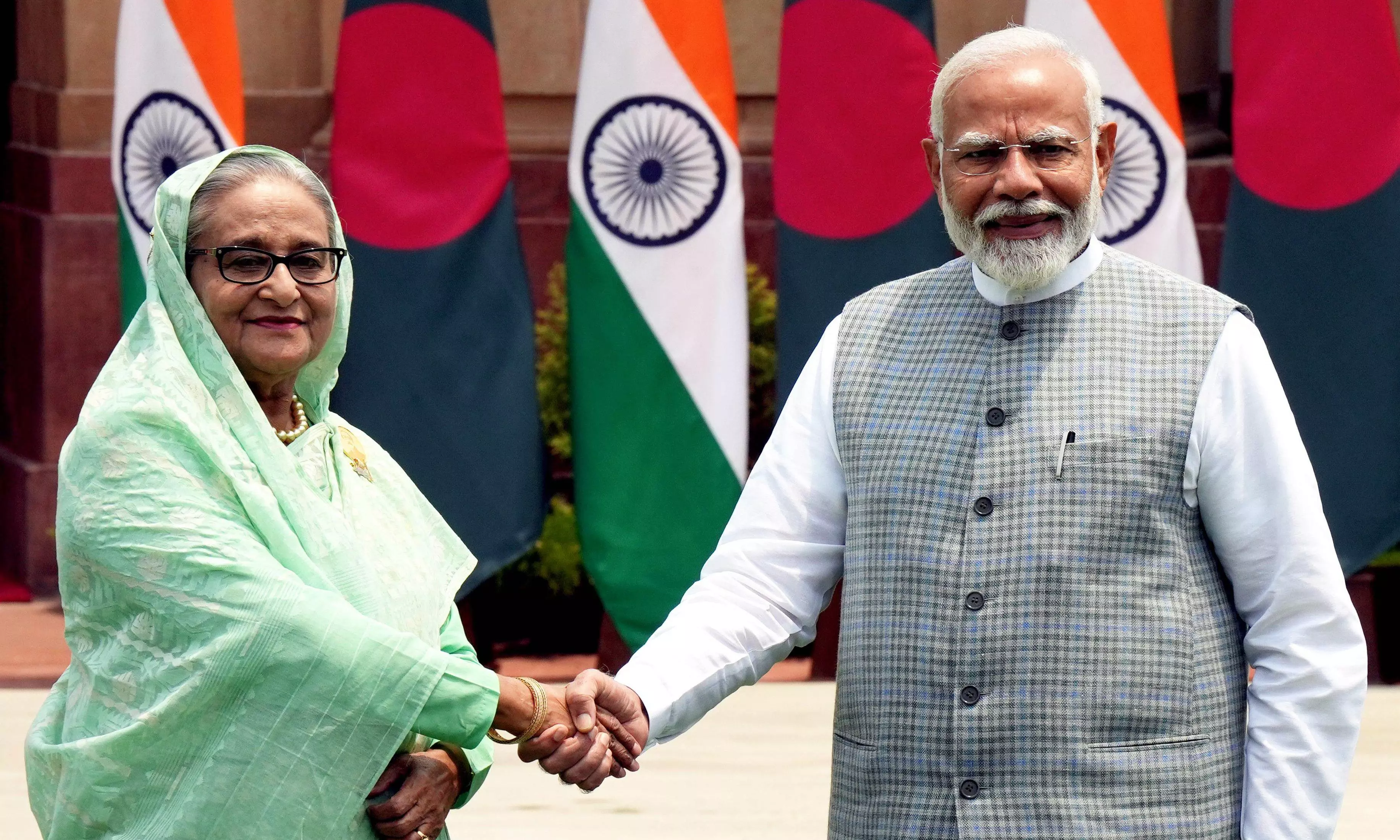
Bangladesh demands Hasina's return; what are India's options?
Whatever decision India takes will have far-reaching implications for India-Bangladesh relations and the broader geopolitical landscape

In a key development, Bangladesh has formally requested India to extradite former Prime Minister Sheikh Hasina for judicial proceedings, putting the Narendra Modi government in a tight diplomatic spot.
While the Ministry of External Affairs (MEA) has acknowledged receiving the request, it has refrained from making any immediate comments. This high-stakes decision could strain India-Bangladesh ties further, with the spectre of geopolitical consequences looming large.
In a discussion on The Federal's Capital Beat programme, international affairs experts Prof Aftab Kamal Pasha and Sanjay Kapoor delve into the complexities surrounding Bangladesh's request for the extradition of former Prime Minister Sheikh Hasina from India.
Also watch: Bangladesh requests Hasina’s extradition: Is India obligated to respond?
Bangladesh’s extradition demand
The Bangladesh government, under its new regime, has sent a note verbale (diplomatic message) to the MEA, formally requesting Sheikh Hasina's extradition. Acting foreign minister Tawhid Hossain stated that the request is tied to judicial processes concerning her time as Prime Minister.
MEA has confirmed receiving the request but has yet to offer a substantive response. The case is unique due to Sheikh Hasina’s long-standing alignment with India during her tenure, which now complicates the situation for New Delhi.
Options for Modi government
According to Professor Aftab Kamal Pasha, the Modi government has three options: Accept the extradition request and comply with Bangladesh’s demand; decline the request by citing loopholes in the extradition treaty or facilitate Sheikh Hasina’s departure to a third country that does not have an extradition treaty with Bangladesh.
Professor Pasha highlighted the challenge of reconciling India’s strategic alignment with Sheikh Hasina during her tenure and the current regime’s antagonistic approach. Rejecting the extradition request outright may further strain bilateral relations, while complying could raise questions about India’s commitment to its allies.
Also read: Dhaka asks India to send deposed PM Hasina back to Bangladesh
Geopolitical implications
While Sanjay Kapoor, an international affairs expert, emphasised the broader geopolitical risks of the extradition.
Bangladesh’s new regime has strengthened ties with China and Pakistan, with two Pakistani ships docking at Chittagong port and discussions on deepening Chinese collaboration. These developments are concerning for India, given its strategic interests in the region.
Furthermore, Kapoor noted that Bangladesh’s evolving alliances could impact India’s connectivity projects and trade relations. The “Chicken Neck” corridor in India’s northeast — a critical geographical stretch — could become vulnerable if bilateral ties deteriorate.
Challenges in extraditing Sheikh Hasina
Both panellists, however, agreed that extraditing Sheikh Hasina presents significant legal and diplomatic challenges. While there are provisions within the India-Bangladesh extradition treaty, certain legal loopholes could be leveraged to delay or avoid compliance. Kapoor pointed out that a pending legal case in India could provide grounds for denial.
Moreover, Sheikh Hasina’s asylum in India adds another layer of complexity. Granting her safe haven has already antagonised the Bangladeshi regime, and any decision to extradite her could undermine India’s image as a dependable ally and a rules-based democracy.
Adani connection
The ongoing investigation into Adani Group projects in Bangladesh adds another dimension to the issue. Kapoor suggested that the outcome of these investigations and the financial stakes involved might influence the Modi government’s decision. He noted that Bangladesh views the Adani projects with suspicion, alleging inflated costs and potential corruption.
The Sheikh Hasina extradition case is a litmus test for India’s foreign policy and regional strategy. As tensions rise and diplomatic stakes escalate, the Modi government’s decision will have far-reaching implications for India-Bangladesh relations and the broader geopolitical landscape.
Disclaimer: The content above has been generated using a fine-tuned AI model. To ensure accuracy, quality, and editorial integrity, we employ a Human-In-The-Loop (HITL) process. While AI assists in creating the initial draft, our experienced editorial team carefully reviews, edits, and refines the content before publication. At The Federal, we combine the efficiency of AI with the expertise of human editors to deliver reliable and insightful journalism.

